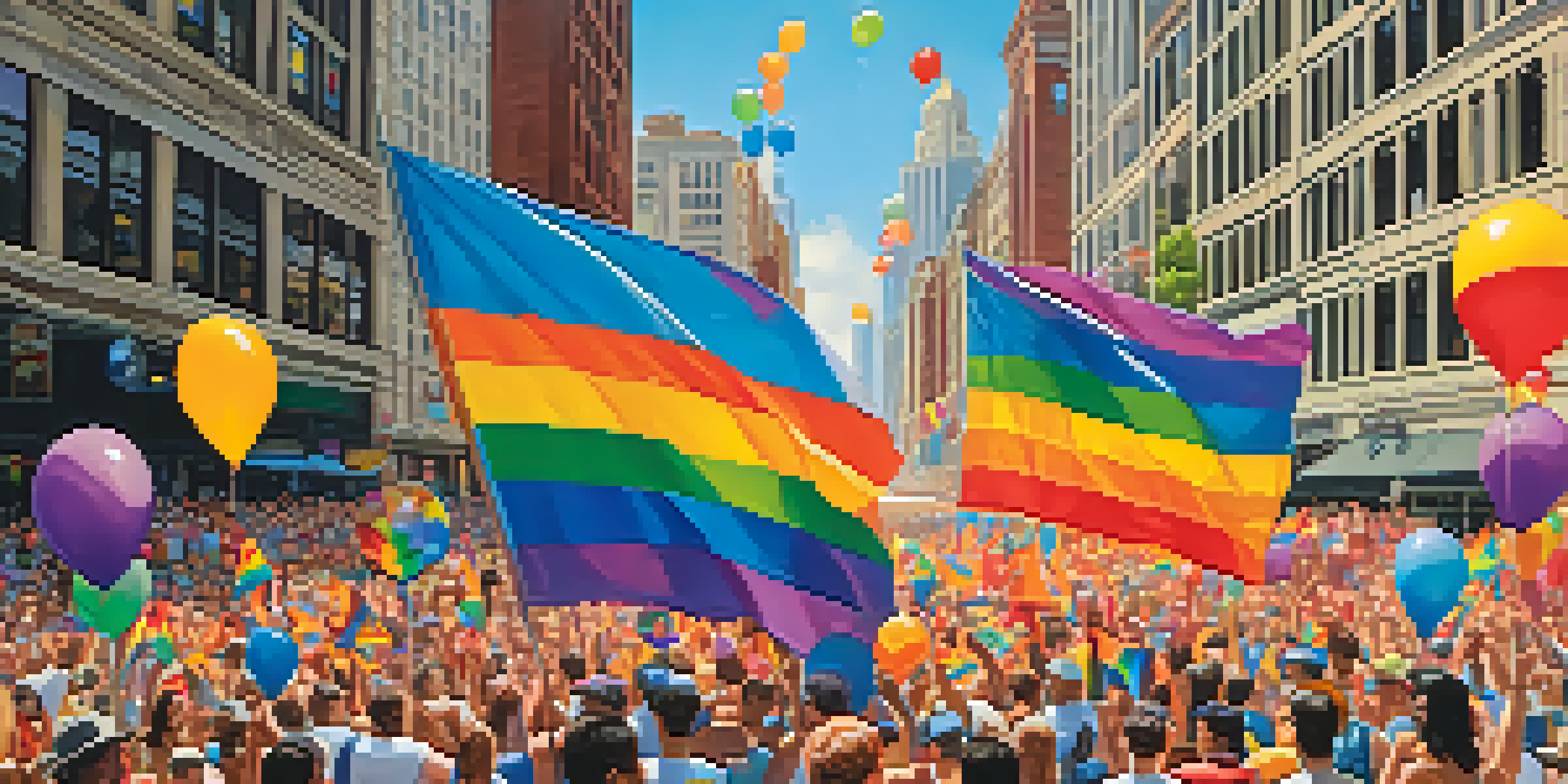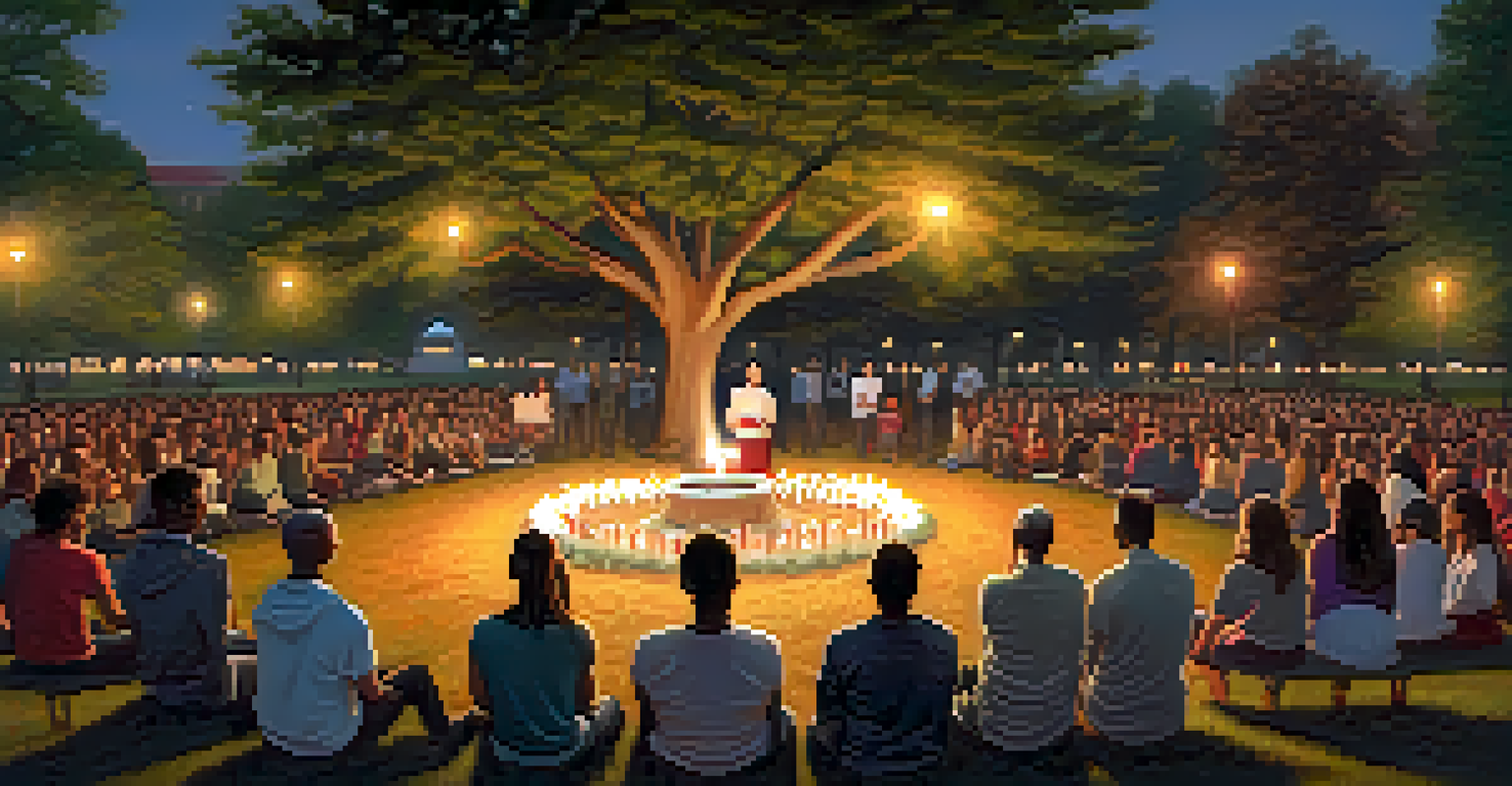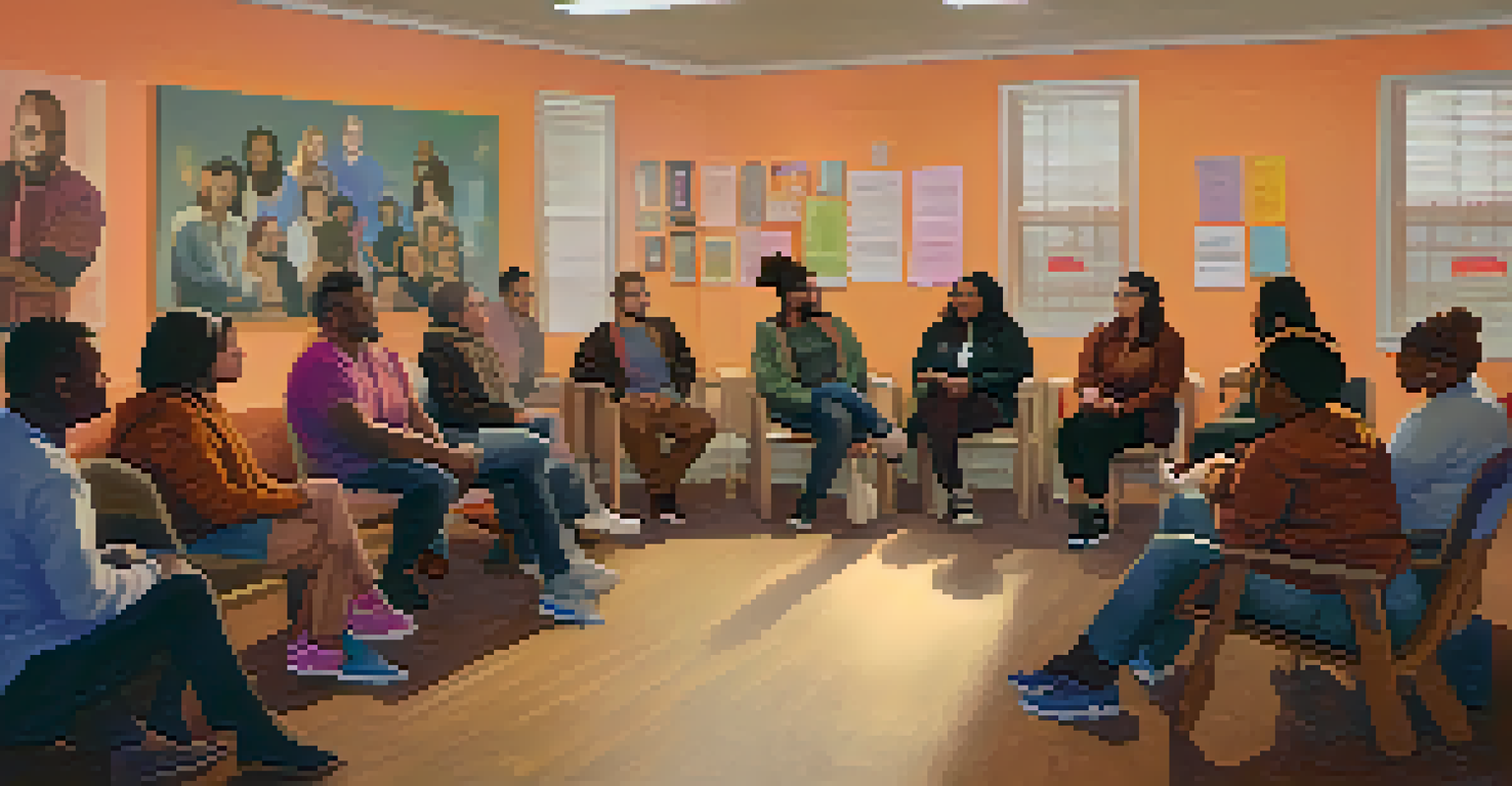Key Milestones in Chicago's LGBTQ+ Rights Movement History

The Early Days: Pre-Stonewall Chicago's LGBTQ+ Community
Before the Stonewall riots in 1969, Chicago's LGBTQ+ community was quietly building its identity. The city was home to various underground bars and social clubs that served as safe havens for LGBTQ+ individuals. These spaces fostered a sense of belonging and community at a time when being openly queer was dangerous.
The only thing that will redeem mankind is cooperation.
In this era, organizations like the Mattachine Society began to form, advocating for the rights and acceptance of gay men. These early activists laid the groundwork for the more visible movements that would follow, emphasizing the importance of solidarity among marginalized groups.
Despite facing severe discrimination and legal challenges, these pioneers navigated a complex social landscape, seeking to uplift their community. Their resilience and determination would become a catalyst for change in the coming decades.
The Stonewall Impact: Chicago's Response in the Late 1960s
The Stonewall riots ignited a nationwide movement for LGBTQ+ rights, and Chicago was no exception. Following the events in New York City, local activists rallied to demand equal rights and visibility for the LGBTQ+ community. The first Chicago Pride Parade took place in 1970, drawing attention to the cause and celebrating identity.

This period saw a surge in LGBTQ+ organizations forming across the city, such as the Gay Liberation Front, which played a pivotal role in advocating for change. Their efforts not only focused on legal rights but also on changing societal attitudes towards the LGBTQ+ community.
Chicago's LGBTQ+ Community History
Before the Stonewall riots, Chicago's LGBTQ+ community built a foundation of identity through underground bars and early activism.
The energy and activism of this era were palpable, and Chicago became a beacon of hope for many. The city's vibrant LGBTQ+ culture began to flourish, setting the stage for future advancements in the rights movement.
The 1980s: HIV/AIDS Crisis and Community Response
The 1980s brought a devastating HIV/AIDS epidemic that profoundly impacted the LGBTQ+ community in Chicago. As the crisis unfolded, grassroots organizations sprang up to provide support, education, and advocacy for those affected. Groups like ACT UP Chicago emerged, demanding government action and healthcare access for those living with HIV/AIDS.
Injustice anywhere is a threat to justice everywhere.
The response to the epidemic highlighted the power of community solidarity. Fundraising events, awareness campaigns, and memorials became key components of the movement, emphasizing the urgency of action against the disease and the stigma surrounding it.
Despite the sorrow and loss, this period also galvanized the LGBTQ+ community, fostering a sense of unity and resilience. The activism born from this crisis would shape public health policy and LGBTQ+ rights for years to come.
Legal Advances: The Fight for Marriage Equality
The fight for marriage equality gained momentum in the early 2000s, with activists in Chicago pushing for legal recognition of same-sex relationships. Grassroots efforts, coupled with strategic legal challenges, began to shift public perception and political support. The Illinois LGBTQ+ community mobilized, organizing rallies and advocacy campaigns to demand equality.
In 2013, Illinois became the 16th state to legalize same-sex marriage, marking a significant victory for activists. This landmark decision was the result of years of tireless work from individuals and organizations dedicated to securing equal rights under the law.
Pride Celebrations Showcase Progress
Chicago's Pride celebrations have evolved into vibrant events that not only celebrate diversity but also advocate for ongoing LGBTQ+ rights.
The legalization of same-sex marriage not only affirmed the rights of LGBTQ+ couples but also symbolized a broader acceptance of diverse identities. Celebrations erupted across Chicago, showcasing the power of advocacy and community in achieving monumental change.
Trans Rights Movement: Advocating for Visibility and Equality
As the LGBTQ+ rights movement evolved, the focus began to shift toward the specific needs and rights of transgender individuals. Activists in Chicago began to highlight issues such as discrimination, healthcare access, and legal recognition for transgender people. The push for visibility and inclusion became a crucial part of the broader movement for equality.
Organizations like the Transformative Justice Law Project of Illinois emerged, working to amplify the voices of transgender individuals and advocate for policy changes. Their efforts included lobbying for the ability to change gender markers on identification documents without barriers.
The fight for trans rights continues to be an essential component of the LGBTQ+ movement, emphasizing that true equality must include everyone. Chicago's trans community demonstrates resilience and strength in the face of ongoing challenges, inspiring future generations of activists.
Pride Celebrations: A Symbol of Progress and Unity
Chicago's Pride celebrations have become a vibrant symbol of the city's LGBTQ+ community and its ongoing struggle for rights. Every June, thousands gather to celebrate diversity, share stories, and advocate for continued progress. These events serve not only as a celebration but also as a reminder of the challenges still faced by many.
The evolution of Pride in Chicago reflects the growth of the LGBTQ+ movement, transitioning from a protest to a celebration of identity and acceptance. The parades and festivals draw supporters from all walks of life, showcasing the city's commitment to inclusion and equality.
Ongoing Challenges Demand Attention
Despite significant advancements, the LGBTQ+ community in Chicago continues to face discrimination and healthcare disparities, necessitating continued activism.
As Pride continues to evolve, it remains a powerful reminder of the history and activism that paved the way for the freedoms enjoyed today. The celebration fosters community spirit and encourages ongoing advocacy for LGBTQ+ rights.
Ongoing Challenges: Fighting for Equality Today
Despite significant progress, the LGBTQ+ community in Chicago still faces numerous challenges. Issues such as discrimination, violence, and disparities in healthcare access persist, particularly among marginalized groups within the community. Activists continue to shine a light on these issues, advocating for policies that promote equality and protect vulnerable individuals.
Organizations across the city are working tirelessly to address these challenges, providing resources and support for those in need. From mental health services to legal advocacy, the commitment to uplifting the community remains strong.

As the movement continues, it's essential to recognize the ongoing struggles and work toward a future where everyone can live authentically and freely. The dedication of Chicago's LGBTQ+ community serves as an inspiration for future generations of advocates.